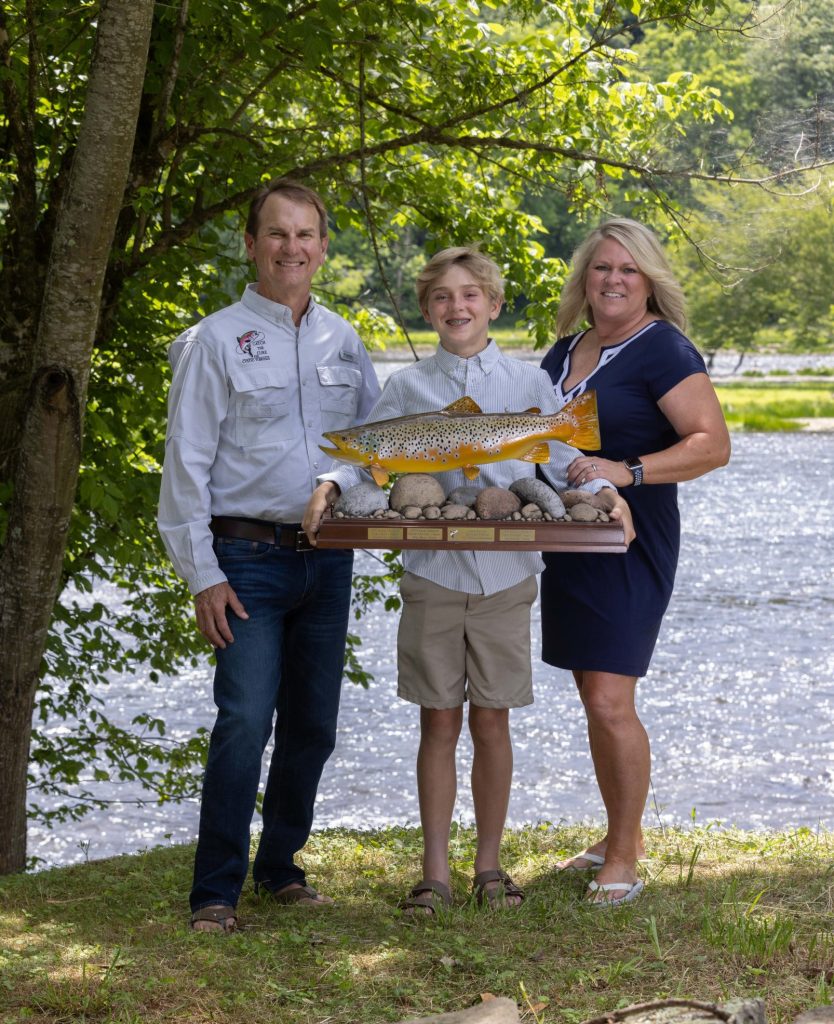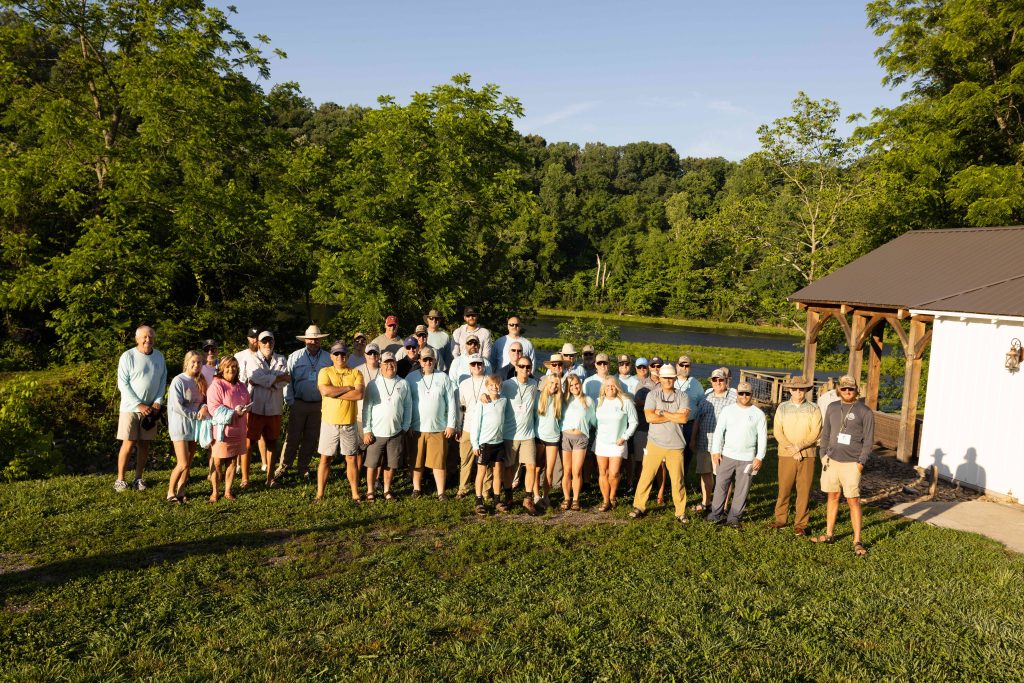East Tennessee efforts provide hope and support for those with cystic fibrosis
School mornings for Tucker Jack begin at 5:30 a.m. At 14 years old, he starts off the day with a sinus rinse and a breathing treatment that lasts about 30 minutes. He takes two medications that are metabolized during that time frame. The treatment uses a compressor that vibrates his lungs to make it easier for him to breathe. After his treatments are done, he eats a hearty breakfast along with about 10 pills that help him digest his food and hold on to the nutrients from the meal. By 7 a.m. he’s ready for the day, and hops in the car with twin sister Caroline and older sister Abby in the driver seat.
Tucker was born with cystic fibrosis, a disease that impacts parts of the body such as the digestive tract and the respiratory system. His parents, Rod and Jennifer—both UT grads—found out about his diagnosis before he was born through genetic testing. The genetic disorder can cause blocked airways and trapped germs, and it can prevent proteins from getting where they need to go in the body, among other things.
Yet despite being diagnosed with such a disease, Tucker seems to live the type of active life many teens lead. Three days a week, he plays soccer for his school and then club soccer right after. And when he’s home, he can be found playing basketball. In the last year, he picked up golf and plays on the course behind their home anytime he can. In the summertime, he’s out on the water with his family fishing, water skiing, and wakeboarding.
He doesn’t let his diagnosis stop him or hold him back in any way, Rod says, adding that he is constantly inspired by his son’s tenacity and bravery. “He’s very gracious and appreciative of what people do for him.” The treatments are not easy to keep up with, but Rod describes Tucker as taking everything in stride.
A New Hope

Tucker’s diagnosis with cystic fibrosis quickly led the Jack family to the East Tennessee Chapter of the Cystic Fibrosis Foundation, an organization whose mission is to find the cure for the disease, while at the same time supporting those affected by it.
One of the ways it has done this is through the accreditation of care centers for patients across the country. This was one of the first initiatives of the foundation back in the ‘50s during a time when there was a lack of awareness not just among the public, but within the medical community. There was confusion among physicians on how to diagnose cystic fibrosis, the best way to treat it, and how to care for it. “The Foundation came in and built the standards of care, and then would go and accredit care centers across the country to help take care of those with cystic fibrosis,” says Leigh Ellington, Executive Director of the East Tennessee chapter.
Leigh’s been working with the foundation for the last 11 years, and during that time, she has witnessed many new discoveries in medication and seen their—and the foundation’s—impact on those with the disease.
“The work of the foundation has been really exciting, and the progress made over the last decade is just unprecedented by any organization I can think of or imagine,” she says, “truly adding decades of life for those with cystic fibrosis.”
Representatives from the foundation lobby for better support and care for those impacted, but the work of the foundation is rooted in research. This work led to one of the biggest achievements in cystic fibrosis research back in 2019. A new medication called Trikafta was approved by the FDA for use for those with cystic fibrosis. The medication was the first triple combination therapy created for the most common forms of the disease.
And for Tucker, it was a game changer.
He began to see improvements in his health soon after he began taking the medication. It’s rare for those with cystic fibrosis to be able to take away medications rather than add to the long list that they already take, Rod says, but it happened in the Jack home.
For the first time, Rod was able to cross off not one, but two medications from that long list tacked to the back of the cabinet door in the kitchen. “It’s just huge for a CF family,” Rod says. “It’s quite a bit to keep up with and manage everything and to have to take all these meds, so when you can take those away, that is humongous.”
Rod’s Idea
As Tucker’s journey with cystic fibrosis unfolded, so too did Rod’s involvement with the foundation. The family had been feeling the support from the organization since they connected with it through a friend before Tucker’s birth, but roughly 12 years ago Rod stepped into a higher role and joined the board, serving for a long while as the chairman. Eventually, it was time for Rod to step down from the role and put his efforts into an idea that had been budding for quite some time: Catch the Cure.
An avid fly-fisherman, Rod started out by traveling around and fishing in other tournaments that supported cystic fibrosis research. He ultimately decided that he wanted to start his own.

“I kind of had a good base here, and a good mentor to get me started, Jim Deanda. He’s got a couple of kids with CF, and he runs a clay shooting fundraiser that he’s been doing for over 20 years. And so he encouraged me to get started, probably a little sooner than I would have,” Rod says.
With the guidance of Jim and a desire to make an impact locally, Rod hosted the first Catch the Cure tournament in 2018. Now held annually in June, the event is a packed day of fly-fishing on the Clinch River and ends with a dinner where connections are made and conversations on cystic fibrosis research are shared.
All proceeds raised from the event benefit cystic fibrosis research. They are given to the organization through Advance the Cure, the small foundation Rod created just a few years ago for the sole purpose of running the tournament and donating the funds raised to the Cystic Fibrosis Foundation, designated for areas of research that impact Tucker.
Rod has raised more than $100,000 in donations for the foundation since the event’s inaugural year.
Foundational Support
The foundation hosts its own fundraisers each year as well, such as Great Strides, an annual spring walk—held this year at The Cove at Concord Park—where all funds raised support the research being done on the disease. The organization also hosts community get-togethers for families with cystic fibrosis throughout the year, knowing how isolating it can be to deal with.
Due to the nature of the disease, individuals with cystic fibrosis should not be together in one space, especially indoors. The foundation helps fight this isolation by hosting outdoor events where those affected can be in the same place, but at a distance.
“When we can get together for events, and caretakers can get together, or CF fighters can be at the same park at the same time at least from 10 feet apart, and see each other, it just helps them feel supported and not alone in a journey that is truly so unique and hard for others to understand who don’t walk it,” Leigh says.
The foundation also funds and accredits about 130 cystic fibrosis care centers across the country, two of which are right here in East Tennessee: the Adult Cystic Fibrosis Care Center at UT Medical and the Pediatric Care Center at East Tennessee Children’s Hospital, where Tucker goes. “That kind of makes Knoxville a go-to for a lot of the surrounding area,” Rod says. “We’re lucky just to live here and be able to take advantage of that.”
Through its work and accreditation, Children’s supports roughly 170 children like Tucker from East Tennessee and the surrounding region with services such as diagnostic sweat and genetic testing, as well as disease management and family education. “They’ve done a great job over at Children’s taking care of Tucker,” Rod says, “and it just gets better every year.”
Finding Support
Rod and Jennifer are a team handling Tucker’s treatment; it’s a way of life for the person suffering and the family supporting them. “The treatments, the meds, the doctor’s appointments, you know, everything that’s involved, that’s our life, and our family supports it,” Rod says.
The network of friends, events that the foundation plans, as well as Rod’s fundraiser help them feel supported and create a much-needed sense of community here locally.
The race to find a cure is still ongoing even with the advancements in medicine like Trikafta and the improvements in treatment. There are 1,800—and counting—mutations that can cause this disease, but the strides made, thanks to the research and lobbying of the Cystic Fibrosis Foundation and impacted families like the Jacks, are significant steps in helping those with cystic fibrosis get better.
Leigh echoes that the goal is always a cure. “Ultimately, we want CF eradicated. We don’t want this to be a concern. Over the next generation, the generation after that, we’d just like to see it gone.”
To learn more about cystic fibrosis and the work being done locally through the Cystic Fibrosis Foundation, visit www.cff.org/chapters/tennessee-chapter.
